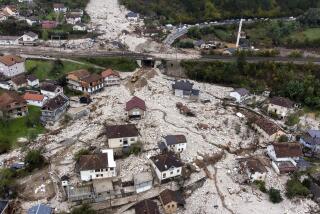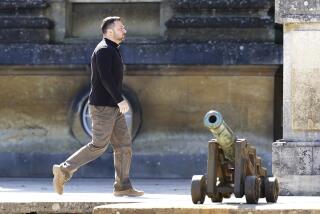Serbs, Rebels Continue Bloody Battle for Kosovo Town
ORAHOVAC, Yugoslavia — Tens of thousands of refugees streamed deeper into guerrilla territory Monday to escape the third straight day of fierce fighting between Serbian forces and militant separatists, ethnic Albanian sources said.
Roughly 25,000 people fled after house-to-house battles in Orahovac, the Albanian-language daily Koha Ditore reported. Both sides have indicated at least 100 people were killed in weekend fighting in the town and near the border with Albania.
Each side also claimed Sunday that it controlled most of Orahovac, which is about 30 miles southwest of Pristina, the capital of the Serbian province of Kosovo. With a population of 20,000, Orahovac is the largest town caught up in the ethnic conflict.
The violence casts more doubt on the possibility of a negotiated settlement between Serbia, which dominates what remains of Yugoslavia, and independence-minded ethnic Albanians, who make up 90% of Kosovo’s population.
Reporters brought to Orahovac’s outskirts by Serbian police saw no signs of life in the town, and no sound or sight of fighting. Smoke was rising from one area; it was not clear what was burning.
Serbian police controlled the southern edge of Orahovac but said separatist Kosovo Liberation Army snipers continued to fire at the town center from hills to the north.
Serbian police Capt. Milan Sipka said one officer was killed and nine were wounded after 600 KLA fighters stormed the town of red brick and concrete houses in the middle of a winemaking region. It was not clear how many ethnic Albanians were killed.
“It’s not safe in our houses . . . because of the snipers,” Sipka said.
The thousands of refugees were moving north to Malisevo, in territory believed held by the KLA, according to Koha Ditore, the Pristina-based newspaper.
If confirmed, the battles would be among the deadliest in nearly five months of fighting in Kosovo.
Albania, angered at Serbian shelling of its territory, said Monday that peace talks between Kosovo’s ethnic Albanians and Yugoslavia could not resume until the violence stopped.
“Political dialogue can only take place when Belgrade pulls out its troops and stops military action,” Albanian Foreign Minister Paskal Milo said in Tirana, the nation’s capital.
Milo said that if efforts to peacefully end the bloodshed fail, Albania will have no choice but to encourage its ethnic kin in neighboring Kosovo to resist.
The United States warned Serbia on Monday not to shell Albanian territory, saying this could aggravate the conflict. Albania said Serbian shells landed in its territory Saturday during fighting in Kosovo.
The European Union on Monday condemned the reported infiltration of fighters from Albania into Kosovo and the alleged shelling on Albanian soil.
The United States and other foreign powers hope that ethnic Albanian leader Ibrahim Rugova, who favors independence but through peaceful means, can reach an agreement with Serbian and Yugoslav authorities on ending the conflict. The United States and European powers support autonomy, but not independence, for Kosovo.
Rugova has lost much of his popular support since the Serbian crackdown on Kosovo, which radicalized Kosovo’s Albanians and resulted in increased backing for the KLA.
In London, Amnesty International on Monday accused Serbian police in Kosovo of running out of control and using “grossly excessive” force against the troubled province’s Albanian population.
This followed reports in May of the summary execution of eight men in the village of Ljubenic, near the Albanian border, and the “disappearance” of another eight in Novi Poklek, in central Kosovo, the human rights group said.
More to Read
Sign up for Essential California
The most important California stories and recommendations in your inbox every morning.
You may occasionally receive promotional content from the Los Angeles Times.










